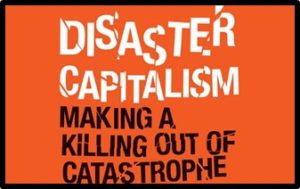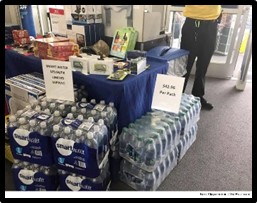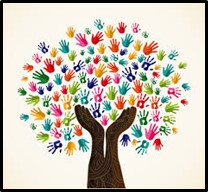Monday Author: Susanne Skinner
Mother Nature needs no invitation to remind us she is a force to be reckoned with. She recently presented us with Hurricane Harvey, followed by his sister Irma; devastating the Caribbean and parts of Texas and Florida. Two of the worst hurricanes in US history; they clocked in at category four and five, leaving unimaginable destruction behind them. Initial reports say costs are so severe they can’t be calculated.
 On the heels of her fury, damages continue to climb, with an estimated 11 million in insurance payouts. These estimates do not take into account lost tourism and, once damages are totaled, costs are predicted to exceed $250 billion.
On the heels of her fury, damages continue to climb, with an estimated 11 million in insurance payouts. These estimates do not take into account lost tourism and, once damages are totaled, costs are predicted to exceed $250 billion.
Natural disasters are fertile ground for retailers and service providers to engage in blatant exploitation of those affected. When natural disasters strike, it’s an invitation for Disaster Capitalism to make a killing on the catastrophe.
Ripping Off Those in Need
As Irma headed straight for south Florida residents were advised to evacuate immediately. Coincidentally, flights out of South Florida skyrocketed to more than $3,000 for tickets that would otherwise have cost a few hundred dollars per person. In what is typically the slowest time of the year for air travel, many major airlines profited shamelessly from those desperate to leave.
 In Florida, price gouging is illegal following a declared state of emergency. However, since airlines are regulated by the Federal Aviation Administration and the U.S. Department of Transportation they are not subject to Florida’s price-gouging statute. By Thursday a $358 flight from Miami to NYC was $3578.
In Florida, price gouging is illegal following a declared state of emergency. However, since airlines are regulated by the Federal Aviation Administration and the U.S. Department of Transportation they are not subject to Florida’s price-gouging statute. By Thursday a $358 flight from Miami to NYC was $3578.
Retailers profited from the survival needs of food and water by jacking up cases of water to over $100 with a $100 delivery fee despite laws designed to prevent them from doing it.
During Hurricane Harvey, reports of hotels tripling or quadrupling their prices, coupled with fuel prices escalating to cash-only sales between $4 and $10 a gallon, represented Disaster Capitalism at its finest.
This is not the first time catastrophe has resulted in greed. In the aftermath of Hurricane Katrina, dozens of private military contractors arrived looking to find ways to profit from the disaster while the government looked the other way. FEMA Director Michael Brown resigned over his handling of the response.
A Mighty Wind
The Saffir-Simpson Hurricane Wind Scale runs from a Category 1 through a Category 5, with Category 5 classified as 157-plus mph winds. A Category 5 storm results in catastrophic damage, flooding and destruction. The National Weather Service called Hurricane Irma one of the strongest storms in history, sustaining maximum winds of 175 mph.
Winds of this magnitude will destroy framed homes, with roof failure and wall collapse. Fallen trees and power poles will isolate residential areas. Power outages will last for weeks, maybe even months. Roads are impassible, neighborhoods become uninhabitable.
While this type of destruction is indiscriminate; the poor are hit harder. Hurricanes target wealthy and poor alike, but the homes of the underprivileged are poorly constructed, often built on hillsides or less-stable ground, and therefore more vulnerable. They have little to begin with, and have no financial means with which to extricate or help themselves.
Homes built to withstand the force of hurricane winds are often on high ground or elevated, with hurricane glass and shutters. They aren’t an iron-clad guarantee, but offer owners greater odds of reduced damage.
Money is king during a disaster. It buys medical and rebuilding services, transportation, and food. Those less fortunate are relegated to crowded tent cities or living in the street with no means to pay for food or shelter.
Good Samaritans
Then there are Good Samaritans. While Irma and Harvey raged, people opened their hearts, their doors and their wallets. Communities offered up accommodation, meals, transportation, clean-up services and support. Facebooks groups sprung up to get the word out; Airbnbs offered to take in families in need, communities launched fundraisers and supply trucks rolled.
 Many volunteers were survivors of Hurricane Katrina, and understanding the impact this was having; formed a digital chain of information, services and shelter across five states.
Many volunteers were survivors of Hurricane Katrina, and understanding the impact this was having; formed a digital chain of information, services and shelter across five states.
Southwest Airlines flew more than 60 stranded animals out of Houston after Hurricane Harvey under Operation Pets Alive. JetBlue said they would charge a maximum of $99 up to the last available seat for direct flights and a maximum of $159 for connecting flights. Scuba divers, boat owners and emergency service providers risked their own lives to find and help those in need.
On the other hand, Delta Airlines jacked their regular ticket price from Miami to Phoenix from $325 to $3,200. American Airlines took a one-way flight for $160 and raised it to $1000 and Spirit Airlines simply cancelled all flights from St. Thomas before the storm even hit.
Investing in Disaster Capitalism
Investors pay close attention to the weather. Once a tropical storm is named, it attracts the attention of Wall Street. Hedge funds employ meteorologists to identify the severity of the threat as quickly as possible. In this case, they were already weighing their exposure to Harvey and bracing for Irma.
As live reports began to broadcast the devastating potential of the storm, stocks began to move. Insurers began selling off. Those concentrated in Florida were hit hard as Hurricane Irma began her trajectory, taking double-digit dives in a single day as the severity of the storm climbed.
Stock in big-box stores like Lowes and Home Depot does the opposite and rises. Investors know that what they sell will be in high demand when restoration efforts begin. All of Lowe’s store managers go through disaster training, Home Depot has a 600,000-square-foot rapid-deployment center and their prices do not change.
People in need should never be exploited or used for financial gain. Demand for survival products increases 300% up to and through an imminent disaster. I’d like to believe those motivated by greed and profit will discover payback comes in unexpected ways.
Karma sees everything.

First, in reply to “gouging” I’d like to link to economist and scholar Thomas Sowell:
‘Price gouging’ in Florida
http://www.jewishworldreview.com/cols/sowell091404.asp
Another by George Mason University Economics Professor Walter Williams:
Williams: Price gouging – or conserving resources?
http://www.richmond.com/opinion/their-opinion/williams-price-gouging-or-conserving-resources/article_38b62a0e-1aeb-59f1-892c-93fd1572789a.html
But the second thing I’d like to comment on is the fact that so few people prepare. Nature is a stone cold b-i-t-c-h, and too many people have a just-in-time mentality about regular and even irregular disasters. It’s only prudent to have a couple of weeks of food on-hand, water and/or water purification, etc.
When I bought my house I then asked the neighbors “WHEN the power goes out in the winter, how long is it out for?” That it would go out, given how far out we were from the town’s center, was a given. Based on that, I sized my generator and fuel storage accordingly.
Building up stocks is not hard, nor does it need to be an overwhelming expense. An extra can or two each shopping trip, a gallon of water here or there, some extra batteries. Over time, these can be built up quite painlessly.
But then, there are those who think it’s someone else’s job to prepare for disasters. Or who think that I will be open-doored magnanimous in sharing what I’ve built up to take care of my family. (I’ve had people who, upon seeing that I’ve ordered yet another box of long-term-storage foods, say “Well, then, I’ll just show up at your house!” to which I reply “If the fits really hit the shan, make sure you wear body armor.”)
The “Greatest Generation” would spit in disgust
https://bayourenaissanceman.blogspot.com/2017/09/the-greatest-generation-would-spit-in.html
Quote:
On the flip side, you have the increasingly common response of individuals and organizations to wait for the authorities to provide. They appear to have no inclination, or feel any sense of personal responsibility, to provide for their own needs before an emergency arises. They’re the people who swamp the stores, buying supplies like water, canned food, and plywood sheets in a last-minute panicked rush, rather than buying them in more peaceful times when there’s less pressure to do so. They’re the people who complain that they can’t afford to spend money on emergency preparations – but they can afford smartphones, and big-screen TV’s, and luxuries like that. They’re the people who sit in evacuation shelters, demanding that the government “do more” for them – but not lifting a finger to do it themselves. They’re organizations like that nursing home in Florida, calling the Governor’s office to demand help – but not even walking across the road to obtain readily-available assistance! They’re behaving like sheep, not like responsible adults . . . and we all know what happens to sheep. They get sheared, or slaughtered, or both. That’s what they’re there for.
End quote
Americans are the most generous people on earth, and we group together to help each other. But before you carp, a little understanding of economics and just a smidge of personal responsibility… ?